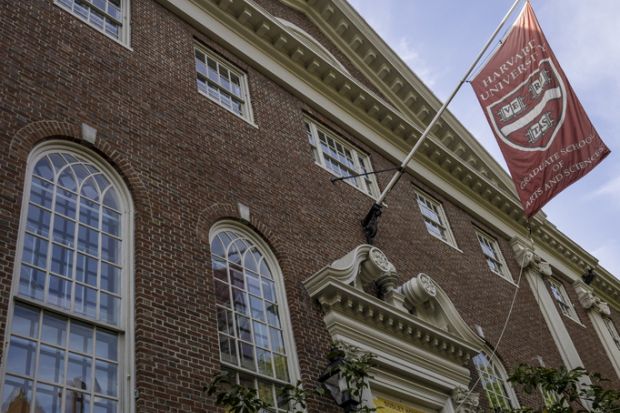Harvard University’s outgoing president Lawrence Bacow has used a speech to the nation’s leading higher education association to rally against silence in the face of political threats to academia, despite facing criticism for naming Harvard’s largest graduate school after a top billionaire funder of Ron DeSantis.
Dr Bacow, accepting a Lifetime Achievement Award at the annual conference of the American Council on Education in Washington on 14 April, condemned partisan attacks aimed at limiting the ability of educators to decide what should be taught in classrooms.
“Each of us has a role to play, to use whatever bully pulpit we have at our disposal, to stand up for the values that define our institutions – in fact the values that define all of higher education,” Dr Bacow told the ACE gathering.
The ACE is the main coordinating body and lobbying entity for US colleges and universities, covering more than 1,700 institutions, and it honoured Dr Bacow for a career that has included the presidencies of Tufts University and Harvard.
Dr Bacow headlined the ACE’s 1,000-delegate conference amid months of escalating campaigns by Mr DeSantis, the governor of Florida, and Republicans in several other states, to assert right-wing political control over the operations and curricula at public colleges and universities.
Mr DeSantis’ numerous actions in that direction include overhauling the New College of Florida, a progressive public liberal arts institution, by installing on its governing board of trustees a majority slate of conservative activists who in turn evicted its president. The governor’s political allies have also been drafting legislation that would give him expanded powers over academic content across the rest of the state’s public colleges and universities.
Dr Bacow urged pushback against such behaviour at the same time he is facing a revolt by Harvard faculty and students over his decision in the past week to name the university’s Graduate School of Arts and Sciences after Kenneth Griffin, a prominent financial backer of Mr DeSantis and other conservative activists.
Harvard decided to honour Mr Griffin after the billionaire investor and university alumnus added $300 million (£240 million) to the $150 million gift he gave the university in 2014. “It has been a great pleasure to get to know Ken throughout my presidency,” Dr Bacow said in a statement announcing the school’s renaming, “and I am deeply and personally appreciative of the confidence he has placed in us – and in our mission – to do good in the world.”
Numerous Harvard scholars and students condemned the renaming and the donation, given Mr Griffin’s stated and financial support for causes such as limits on LGBTQ protections, and for Mr DeSantis and other politicians, including Donald Trump. More fundamentally, said Naomi Oreskes, professor of the history of science at Harvard, the gift is problematic “because our current political economy creates billionaires who then get to decide on social and educational priorities, often in ways that privilege the already privileged and neglect problems like homelessness”.
Dr Bacow, after his address to the ACE conference, declined to discuss the Griffin renaming. He plans to step down at the end of the current academic year after five years leading Harvard. He will be succeeded by Claudine Gay, dean of the Faculty of Arts and Sciences, who will become Harvard’s first black president.
ACE, meanwhile, is also turning more inward in its handling of such high-profile events. This year’s conference reserved several of its sessions with government officials – including briefings by the director of the National Science Foundation, an FBI expert in counterintelligence investigations, and Biden administration and congressional officials – for campus presidents and chancellors only. It plans to make that practice universal next year, saying that only institutional leaders will be allowed to attend its next annual conference.
The new format, an ACE spokesman said, “will provide us with the capacity to strategically redesign and refocus our convening model and ensure that we are best positioned to impact the future of higher education in the years to come”.
In his address, Dr Bacow called the annual conference “one of ACE's most important functions”. It is a moment, he said, “when we get to learn from each other, where we get to grow and connect with each other, where friendships are formed that endure”.
Register to continue
Why register?
- Registration is free and only takes a moment
- Once registered, you can read 3 articles a month
- Sign up for our newsletter
Subscribe
Or subscribe for unlimited access to:
- Unlimited access to news, views, insights & reviews
- Digital editions
- Digital access to THE’s university and college rankings analysis
Already registered or a current subscriber? Login








